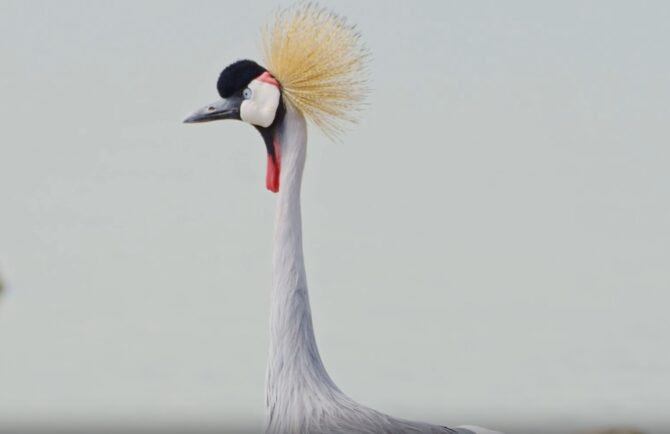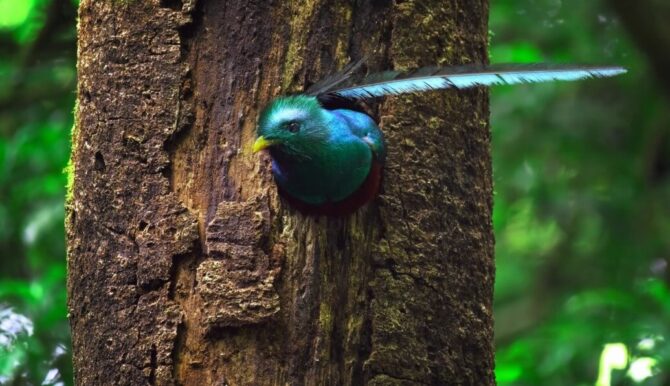They’ve been around since the time of dinosaurs, yet crocodiles remain some of the most mysterious creatures on the planet. One question that often fascinates people is how long these ancient reptiles can go without eating.
We’ll talk about the science behind their metabolic processes, explore environmental factors that influence their eating habits, and even peek into the world of crocodile fasting rituals. So, strap in and join us on this incredible journey of discovery.
The Basics
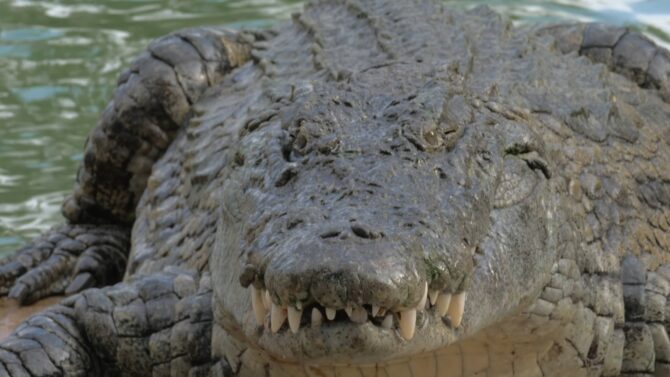
Before we get into the meat (pun intended!) of how long a crocodile can go without eating, let’s familiarize ourselves with some basic facts about these ancient reptiles. Knowing their biology and lifestyle can help us understand their extraordinary fasting abilities.
Physical Characteristics
Crocodiles are cold-blooded, which means their internal body temperature is regulated by their environment. Unlike mammals, they don’t burn calories to keep warm. This energy efficiency is one of the key reasons they can go long periods without food. They have a slow metabolism, which further enhances their ability to fast for extended periods.
Dietary Habits
Crocodiles are carnivorous apex predators. Their diet primarily consists of fish, birds, and mammals. When they do eat, they can consume up to half their body weight in one meal, storing excess calories as fat reserves. This is crucial for their survival during the times when food is scarce.
Metabolism Explained
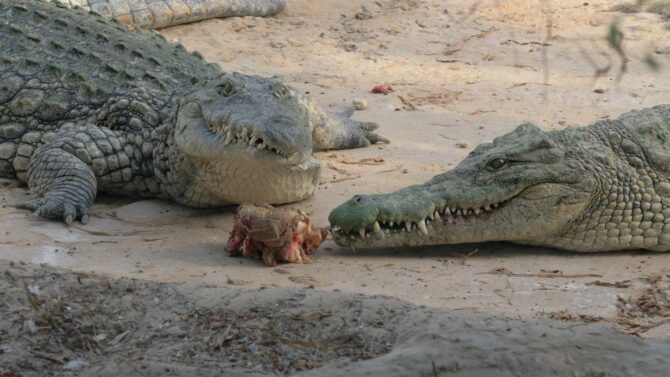
The metabolism of a crocodile is a fascinating subject that plays a key role in how long it can go without food. Let’s break down some of the science to make it more understandable.
Cold-Blooded Metabolism
Crocodiles are ectothermic, which means their metabolic rate is largely determined by the external environment. As the temperature drops, so does their need for calories. This is in stark contrast to warm-blooded animals, who require a constant intake of food to maintain their body temperature.
Metabolic Rates and Energy Efficiency
- Lower Metabolic Rate: Crocodiles have a lower metabolic rate compared to warm-blooded animals. This allows them to conserve energy efficiently.
- Glycogen and Fat Reserves: When a crocodile eats, it stores glycogen and fat reserves which can be used during periods of fasting.
- Energy Distribution: These animals utilize their energy wisely, prioritizing essential functions like maintaining cellular structure and basic bodily functions during times of scarcity.
Environmental Factors
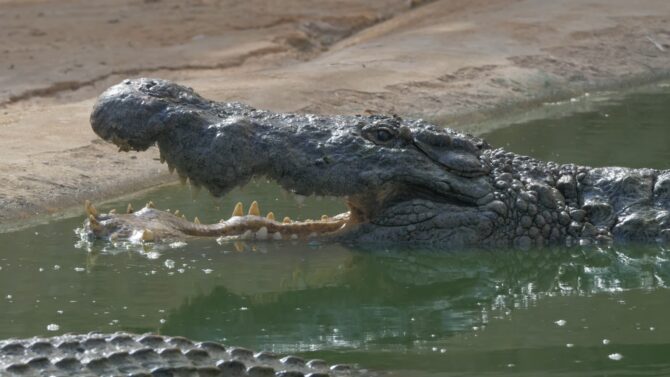
Now that we understand a bit about crocodile metabolism let’s explore how environmental factors like temperature and availability of food can affect their eating habits.
Seasonal Variations
In the wild, food availability can be season-dependent. During the wet season, crocodiles often have an abundance of food resources. However, during the dry season, these resources can become scarce. Crocodiles are well-adapted to these fluctuations and can go without food for extended periods when required.
Human Activities
In areas where crocodiles co-exist with human populations, factors like overfishing can significantly affect their diet. They are remarkably adaptable creatures, but prolonged scarcity due to human activities can pose challenges. However, their ability to fast becomes a crucial survival skill in such situations.
The Science of Fasting in Crocodiles
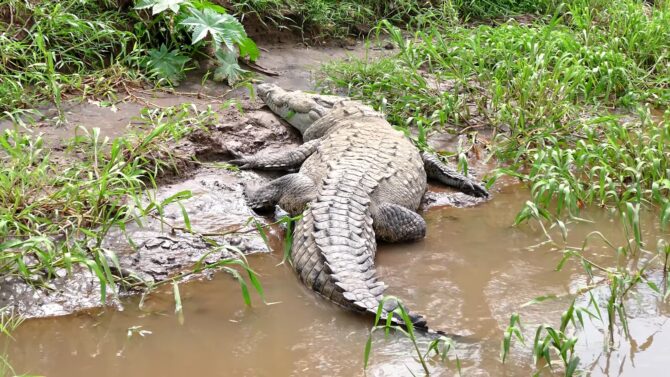
So, after understanding their metabolism and the influence of environmental factors, how long can a crocodile actually go without eating?
Fasting Duration: The Astonishing Reality
The simple answer is that a healthy adult crocodile can go without eating for up to a year, but that’s with a catch. This long fasting period depends on several factors like their last meal size, metabolic rate, and environmental conditions. Research shows that juvenile crocodiles, due to their faster growth rates and higher metabolic needs, cannot fast as long as adults.
What Happens During Fasting?
When fasting, the crocodile’s body switches to a survival mode where it relies on stored fats for energy. Organs like the liver play a key role in converting these fats into usable energy. Meanwhile, their metabolic rate drops further to conserve energy, slowing down processes like heart rate and respiration.
Other Fascinating Facts
Just when you thought you knew everything about crocodile fasting, here are some additional tidbits that are sure to captivate your imagination.
Fasting Rituals and Myths
Crocodiles have often been part of folklore and myths. In some cultures, it’s believed that they fast during specific lunar cycles or seasons, attributing it to spiritual practices. Although there’s no scientific evidence supporting these claims, the crocodile’s natural ability to fast certainly adds to its mystical aura.
Fasting vs. Starvation
It’s crucial to differentiate between fasting and starvation. Fasting is a controlled process where the animal relies on stored reserves for survival. Starvation, on the other hand, occurs when these reserves are depleted to a point where the animal cannot maintain its basic functions, eventually leading to death.
Why Understanding Fasting Matters
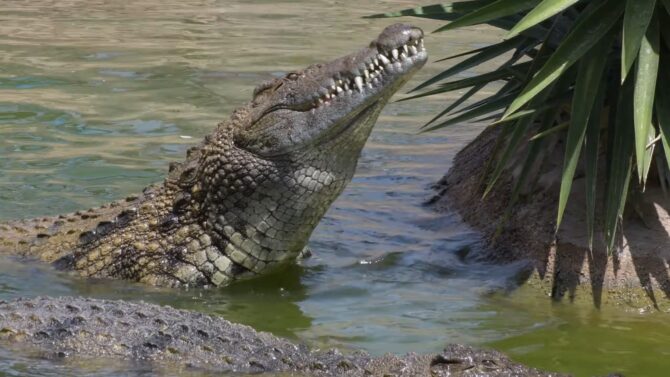
In a world where habitat destruction and human interference are affecting wildlife, understanding the crocodile’s fasting abilities isn’t merely an academic exercise—it has direct implications for their conservation.
Monitoring Health in Conservation Programs
Conservationists can monitor crocodiles’ health more effectively by understanding their metabolic rates and fasting durations. When rescuing crocodiles, it’s important to know the signs of malnutrition versus natural fasting states. Accurate knowledge can influence treatment plans and reintroduction strategies, ensuring the reptiles’ long-term survival.
Implications for Habitat Protection
Understanding the fasting capabilities of crocodiles can also inform conservation policies around habitat protection. Knowing that crocodiles can survive for long periods without food could influence decisions about resource allocation in protected areas, especially during seasonal changes when food is scarce.
The World of Crocodiles: More than Just Fasting
As we wrap up this enlightening exploration, let’s take a moment to appreciate that the fascinating world of crocodiles is not confined to their fasting abilities. They have a range of traits and behaviors that make them one of the most intriguing species on Earth.
Communication and Social Behavior
- Vocalizations: Crocodiles are known to communicate through a variety of vocalizations, like growls and barks, to establish territory or attract mates.
- Visual Signals: They also use visual cues such as posturing to communicate with each other.
- Social Structure: While not social animals in the conventional sense, crocodiles do exhibit a certain level of social organization, including a hierarchy based on size and age.
Reproductive Habits
Crocodiles lay eggs, and the temperature of the nest can determine the sex of the offspring, a phenomenon known as temperature-dependent sex determination.
Females typically guard their nests and may help their young reach water once they hatch. Their maternal instincts are an interesting contrast to their predatory nature.
Survival Skills
While their predatory skills and fasting abilities are often highlighted, crocodiles are also excellent swimmers and can cover large distances. They have a keen sense of smell and acute vision, which not only makes them effective hunters but also helps them avoid threats.
FAQs
Do crocodiles drink water during their fasting periods?
Yes, they do consume water during their fasting periods. Unlike their approach to food, they need to stay hydrated and will continue to drink water even when they are not eating. Water is essential for various physiological processes, including digestion for when they eventually eat again.
How does fasting affect a crocodile’s growth rate?
Extended fasting can slow down the growth rate, especially among juveniles who require more nutrients for growth. However, adults are less affected as they have reached their optimal size. Their bodies are more adept at utilizing stored fat reserves for essential metabolic functions during periods of fasting.
Do saltwater and freshwater crocodiles differ in their fasting abilities?
Both saltwater and freshwater ones have similar metabolic rates and fasting abilities. However, their fasting duration might slightly differ due to the availability of food in their specific habitats. Saltwater crocodiles might have a more diverse range of prey, possibly reducing the need for extended fasting as compared to some freshwater species.
Are there specific signs that indicate crocodiles are entering a fasting state?
There are no overt signs that they are entering a fasting state, as it is largely an internal metabolic adjustment. However, behavioral changes such as reduced movement, less aggressive territorial behavior, and spending more time basking in the sun could be indirect indicators that the crocodile is conserving energy for a fasting period.
How do crocodiles find food after a long period of fasting?
After a prolonged fasting period, they use their acute sense of smell and vision to locate prey. They are ambush predators, lying in wait for an opportune moment to strike. Their excellent swimming capabilities also allow them to cover large distances in search of food.
Is there a difference between male and female crocodiles when it comes to fasting?
Generally, there is no significant difference between males and females in terms of fasting abilities. Both sexes store fat reserves and utilize them in much the same way. However, females may require more energy during the breeding season for egg production and nesting, which could potentially reduce their fasting duration during that specific time.
Final Words
The crocodile’s ability to go without food is not just a remarkable biological feat; it’s a testament to their evolutionary perfection. Their unique metabolic rates, coupled with environmental adaptability and efficient energy storage, allow them to survive in some of the most challenging conditions on Earth.
So, the next time someone asks you, “How long can a crocodile go without eating?” you’ll have a lot more to say than just citing a duration!

